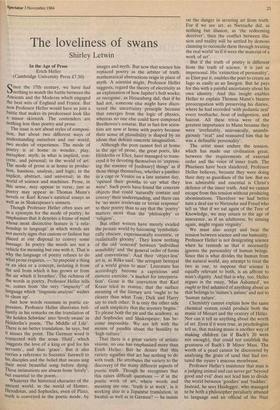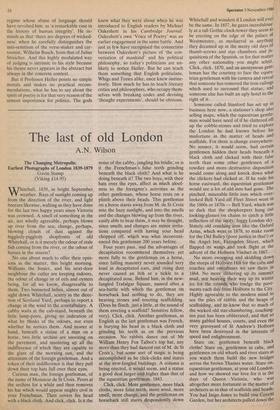The loveliness of swans
Shirley Letwin
In the Age of Prose Erich Heller (Cambridge University Press £7.50)
since the 17th century, we have had nothing to match the battle between the Ancients and the Moderns which engaged the best wits of England and France. But now Professor Heller would have us join a battle that makes its predecessor look like a minor skirmish. The contenders are nothing less than poetry and prose.
The issue is not about styles of composi- tion, but about two different ways of understanding ourselves and our world, two modes of experience. The mode of poetry is at home in wonder, play, metaphor, myth; in what is implicit, con- crete, and personal; in the world of art. The mode of prose is at home in produc- tion, business, analysis, and logic; in the explicit, abstract, and universal; in the world of science and machines. Prose, in this sense, may appear in verse, just as Poetry may appear in Thomas Mann's novels or Karl Kraus's satirical essays as well as in Shakespeare's sonnets.
Though Professor Heller often uses art as a synonym for the mode of poetry, he emphasises that it denotes a frame of mind whose most distinctive feature is 'a rela- tionship to language' in which words are not merely signs that custom or fashion has placed at our disposal to convey some message. In poetry the words are not a vehicle for meaning but one with it. That is why the language of poetry refuses to do what prose requires, — `to pinpoint a thing or an idea or a concept, isolating it from the soil from which it has grown or from the air which it breathes'. The richness of the words in poetry, Professor Heller tells us, comes from 'the very "impurity" of language which "linguistic analysis" wishes to clean up'.
Just how words resonate in poetic ex- pression, Professor Heller illustrates bril- liantly in his remarks on the translation of 'ihr holden Schwane' into 'lovely swans' in Holderlin's poem, 'The Middle of Life'. There is no better translation, he says, but it misses the point. The German word is connected with the noun 'HuId', which 'suggests the love of a king or god for his servants', and thus 'grace'. But it also carries a reference to Socrates' farewell to his disciples and the belief that swans sing their most beautiful song before dying. These intimations are absent from 'lovely', but essential to the poem.
Whatever the historical character of the ancient world, in the world of Homer, Herodotus, and Sophocles, even of Plato, truth is conveyed in the poetic mode, by images and myth. But now that science has replaced poetry as the arbiter of truth, mathematical abstractions reign in place of myth. A scientist might, Professor Heller suggests, regard the theory of electricity as an explanation of how Jupiter's bolt works; or recognise, as Heisenberg did, that if he had not, someone else might have disco- vered the uncertainty principle because that emerges from the logic of physics, whereas no one else could have composed Beethoven's sonatas. But in fact few scien- tists are now at home with poetry because their sense of plausibility is shaped by an idiom that defeats concrete imagination.
Although the poet cannot feel at home in the age of prose, the great poets, like HOlderlin or Eliot, have managed to trans- cend it by devoting themselves to 'express- ing the essence of [ordinary] things' as if those things themselves, whether a panther in a cage or Venice on a late autumn day, 'opened their mouths to say what they were'. Such poets have found the concrete objects that could 'naturally contain and convey' their understanding, and there can be `no more irrelevant or trivial response' to their poetry than to say that the 'poetry' matters more than the 'philosophy' or 'religion'.
But other writers have merely evaded the prosaic world by becoming `symbolisti- cally obscure, experimentally eccentric, or realistically gloomy'. They know nothing of the old 'concord' between 'individual sensibility' and 'the general order of forms and conventions'. And their 'object-less' art is, as Rilke said, 'the arrogant betrayal of a world given to man'. Literature has accordingly become a capricious and esoteric exercise, 'a market for interpreta- tion'. Gone is the conviction that Karl Kraus tried to restore, that the surface meaning of the literary arts 'ought to be clearer than what Tom, Dick and Harry say to each other. It is only the other side of such simplicity that the mystery begins.' To please both the pit and the academy, as did Sophocles and Shakespeare, has be- come impossible. We are left with the moans of pundits about the hostility to `high culture'.
That there is a great variety of artistic visions, no one has emphasised more than Erich Heller. But he denies that this variety signifies that art has nothing to do with truth. He attributes the variety to the discovery of the many different aspects of poetic truth. Though he recognises that this raises difficult questions — if in the poetic work of art, where words and meaning are one, 'truth is at work', is it working also in a Japanese translation, in Swahili as well as in German? — he insists
on the danger in severing art from truth. For if we see art, as Nietzsche did, as nothing but illusion, as 'the redeeming deceiver', then the conflict between illu- sion and reality will be settled by demons claiming to reconcile them through treating the real world 'as if it were the material of a work of art'.
But if the truth of poetry is different from the truth of science, it is just as impersonal. His 'extinction of personality', as Eliot put it, enables the poet to create an Iago as easily as an Imogen. But he pays for this with a painful uncertainty about his own identity. And this insight enables Heller to explain Thomas Mann's bizarre preoccupation with preserving his diaries, where he had recorded 'with pedantic zeal' every toothache, bout of indigestion, and haircut. All these trivia were of the greatest importance to Mann because they were 'irrefutably, unironically, unambi- guously "real" and reassured him that he was a definable personality'.
The artist must endure the tension, which has made our civilisation great, between the requirements of external order and the voice of inner truth. The Pharisees have been slandered, Professor Heller believes, because they were doing their duty as guardians of the law. But no less admirable and essential is Christ's defence of the inner truth. And we cannot escape from this tension without producing abominations. Therefore we had better turn a deaf ear to Nietzsche and Freud who tell us 'that if we eat again of the Tree of Knowledge, we may return to the age of innocence, as if an adulteress, by sinning again, might regain virginity'.
We must also accept and bear the tension between science and our humanity. Professor Heller is not denigrating science when he reminds us that it necessarily ignores the personality of human beings. Since this is what divides the human from the natural world, any attempt to treat the two as one, to suppose that science is equally relevant to both, is an affront to man's dignity. And that is why, too, Heller argues in the essay, 'Man Ashamed', we ought to feel ashamed of anything about us that belongs to 'nature's nature' and not to `human nature'.
Chemistry cannot explain how the same chemical system could produce both the music of Mozart and the oratory of Hitler. Nor can it tell us anything about the worth of art. Even if it were true, as psychologists tell us, that making music is another way of making children (as if Bach's 20 were not enough), that could not establish the greatness of Bach's B Minor Mass. The worth of a pearl cannot be discovered by analysing the grain of sand that had irri- tated the oyster's mucous membrane.
Professor Heller's insistence that man is a judging animal and can never get 'beyond good and evil' does not lead him to divide the world between 'goodies' and 'baddies'. Instead, he sees Heidegger, who managed to be both a philosopher peculiarly attuned to language and an official of the Nazi regime whose abuse of language should have revolted him, as 'a remarkable case in the history of human integrity'. He re- minds us that 'there are degrees of wicked- ness' when he carefully distinguishes the anti-semitism of the verse-maker and car- toonist. Wilhelm Busch, from that of Julius Streicher. And this highly modulated way of judging is intrinsic to his style because his theme never appears in the abstract but always in the concrete context.
But if Professor Heller points no simple morals and makes no practical recom- mendations, what he has to say about the spirit of poetry is for that very reason of the utmost importance for politics. The gods
knew what they were about when he was introduced to English readers by Michael Oakeshott in his Cambridge Journal. Oakeshott's own 'Voice of Poetry' was an earlier engagement in the same battle. And just as few have recognised the connection between Oakeshott's picture of 'the con- versation of mankind' and his political philosophy, so today's politicians are un- likely to notice Heller. But he can teach them something that English politicians, Whigs and Tories alike, once knew instinc- tively. How much he has to teach literary critics and philosophers, who occupy them- selves with breaking codes and devising 'thought experiments', should be obvious.











































 Previous page
Previous page